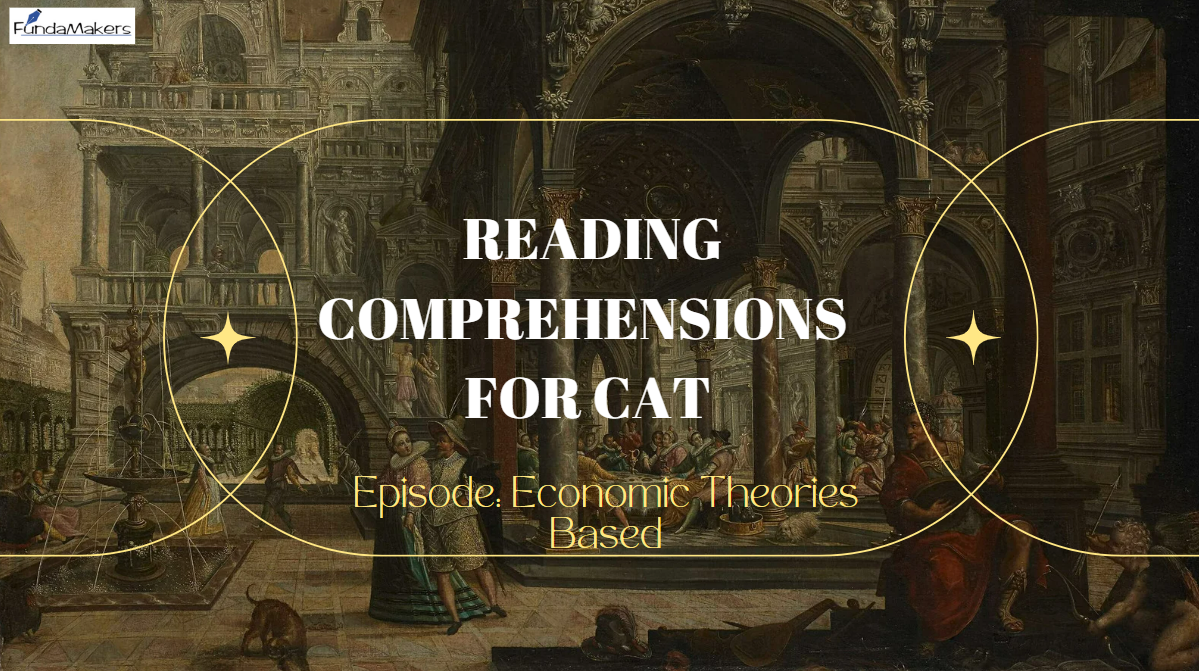In the realm of CAT preparation, mastering Reading Comprehension (RC) is akin to unlocking a treasure trove of vital skills. Yet, delving into RC passages solely for their surface content overlooks a crucial aspect: the economic theories that often underpin them. Understanding why RCs based on economic theories are mandatory for CAT preparation illuminates the broader significance of these passages. In this blog, we’ll explore the symbiotic relationship between economic theory and CAT success, urging readers to delve deeper into the provided passages to unearth invaluable insights for their exam readiness.
So, let’s embark on this intellectual journey together, navigating through the corridors of economic thought to sharpen our CAT skills.
Passage 1.
Science instills optimism in the potential of human progress, whereas the exploration of Literature and Art often fixates on the achievements of the past. Comparisons with the accomplishments of bygone eras, such as those of ancient Greece or the Renaissance, frequently overshadow contemporary endeavors, making originality more elusive. Contrary to scientific advancement, artistic success does not accumulate over time; instead, it relies on a certain freshness and sincerity of expression, qualities eroded by the march of civilization. Consequently, individuals steeped in the cultural legacy of preceding epochs may develop a critical attitude toward contemporary works, oscillating between dissatisfaction and an attempt at radical originality that often yields eccentricity rather than greatness.
Questions:
- According to the passage, what does science inspire in terms of human potential?
A) Pessimism
B) Optimism
C) Apathy
D) Confusion
Correct option: B) Optimism
2. How does the study of Literature and Art differ from that of Science, as per the passage?
A) It focuses on future achievements.
B) It revolves around past accomplishments.
C) It ignores historical context.
D) It disregards originality.
Correct option: B) It revolves around past accomplishments.
3. What effect do comparisons with past achievements have on contemporary artistic endeavors?
A) They facilitate originality
B) They diminish the importance of tradition.
C) They increase the difficulty of achieving originality.
D) They encourage simplicity and spontaneity.
Correct option: C) They increase the difficulty of achieving originality.
4. How does the passage characterize the impact of civilization on artistic expression?
- It enhances freshness and sincerity.
B) It fosters simplicity and spontaneity.
C) It diminishes originality and vision.
D) It promotes peevishness and fastidiousness.
Correct option: C) It diminishes originality and vision
Passage 2.
Before long, there would emerge just two distinct categories of individuals globally: those who possessed assets and those who traded their labor to them. As ideologies faded, which had once justified inequality as natural and predestined, it became inevitable that workers worldwide would recognize the system’s true nature and would rebel against it. This foresighted prediction was articulated by Karl Marx in “The Communist Manifesto.” And as events unfold, his words continue to ring true.
In light of his significant relevance to present-day politics, it’s noteworthy that two recent influential works about Marx are dedicated to situating him within his own era. Jonathan Sperber, in “Karl Marx: A Nineteenth-Century Life” (Liveright, 2013), emphatically asserts that “Marx was not our contemporary,” emphasizing his status as a historical figure rather than a modern-day prophet. Similarly, Gareth Stedman Jones aims to contextualize Marx within the nineteenth century in his latest publication, “Karl Marx: Greatness and Illusion” (Harvard).
This endeavor is commendable. Historians strive to contextualize and avoid anachronistic interpretations of the past. Both Sperber, a professor at the University of Missouri, and Stedman Jones, who teaches at Queen Mary University of London and co-directs the Centre for History and Economics at the University of Cambridge, bring considerable expertise to the task of grounding Marx within the intellectual and political milieu of nineteenth-century Europe.
Questions
1.Who made the prediction about the emergence of two distinct societal classes based on property ownership?
a) Jonathan Sperber
b) Karl Marx
c) Gareth Stedman Jones
d) A contemporary scholar
2.According to the passage, what did Karl Marx predict about the inevitable outcome for workers worldwide?
a) They would embrace capitalism.
b) They would overthrow the existing system.
c) They would become property owners.
d) They would advocate for socialism.
3.What is the primary objective of Jonathan Sperber’s book “Karl Marx: A Nineteenth-Century Life”?
a) To emphasize Marx’s relevance to contemporary politics.
b) To place Marx within the context of the nineteenth century.
c) To analyze Marx’s economic theories.
d) To explore Marx’s influence on modern philosophy.
4.Which of the following best describes the authors’ approach in situating Marx within his historical context?
a) Emphasizing his role as a modern-day prophet
b) Presenting him as disconnected from his era
c) Grounding him within nineteenth-century Europe
d) Focusing solely on his economic contributions
Correct options-
- b) Karl Marx
- b) They would overthrow the existing system.
- b) To place Marx within the context of the nineteenth century.
- c) Grounding him within nineteenth-century Europe
Passage 3.
In its infancy, socialism emerged as a revolutionary force aimed at liberating the working class and establishing principles of freedom and justice. Initially, the transition from capitalism to this new order was envisioned to be sudden and forceful, involving the expropriation of capitalists without compensation, with no replacement authority. However, over time, socialism underwent a transformation. In France, socialists integrated into the government, wielding influence over parliamentary majorities. In Germany, the strength of social democracy led to compromises for government recognition. Meanwhile, in England, the Fabians promoted reform over revolution and advocated conciliatory approaches over antagonism.
The strategy of gradual reform presents advantages over revolution, and I refrain from advocating for revolution. Nonetheless, gradual reform carries certain risks, such as the state assuming control of previously private enterprises and legislative intervention favoring specific sections of the working class. It remains uncertain whether such measures align with the original ideals of socialism that inspired its proponents.
Consider the example of state acquisition of railways. This exemplifies state socialism, feasible and already implemented in various nations, representing a step towards complete collectivism through incremental means. Yet, it is questionable whether such actions truly advance democracy, freedom, or economic justice, especially when compensation is provided to shareholders upon nationalization.
Questions:
- What was the initial objective of socialism according to the passage?
- A) Economic domination
- B) Liberation of the working class
- C) Political suppression
- D) Expansion of capitalist power
- Correct Answer: B) Liberation of the working class
- How did socialism evolve in France?
- A) By advocating for extreme revolution
- B) By becoming a part of the government
- C) By boycotting parliamentary activities
- D) By forming underground resistance movements
- Correct Answer: B) By becoming a part of the government
- What did the Fabians emphasize in England?
- A) Radical revolution
- B) Violent overthrow of the government
- C) Gradual reform over revolution
- D) Antagonistic approaches
- Correct Answer: C) Gradual reform over revolution
- What is a potential downside of gradual reform mentioned in the passage?
- A) Rapid societal transformation
- B) Empowerment of the working class
- C) Legislative favoritism towards specific groups
- D) Resistance to government recognition
- Correct Answer: C) Legislative favoritism towards specific groups
Test your Caliber with us!
FundaMakers provide a series of RCs, and previous year questions based on RCs on our site. Tap on ” CAT Question Bank” and visit our Question bank section perfectly tailored for CAT aspirants.
Visit the link below to practice reading comprehensions based on Indian National Movement:



